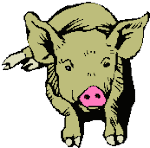The Guardian is well on trail of the most serious scandal of the twenty-first century, so far.
DNA will, of course, expose the criminals killing the kids.
They did not expect that. They thought that PR and intimidation of critics and witnesses to Parliament would protect them.
Guardian article in full here.
Is
the rise in antibiotic use on farms a threat to humans?
Experts
and campaigners worry about the use of veterinary antibiotics, but officials
say there is little cause for concern.
The use
of some of the most potent antibiotics available has surged among British
farmers in the last decade, stoking fears that the burgeoning number of factory
farms could greatly increase the risk ofantibiotic-resistant strains of bacteria escaping and infecting people.
Medicines
to treat meningitis, pneumonia and other serious diseases, called third and
fourth generation cephalosporins, increased threefold from 2003-11, while drugs called fluoroquinolones – used for
tuberculosis, C difficile,
HIV-related infections and others – are up by 50% in the same period.
These antibiotics have been flagged by the World Health
Organisation as some of the most important in human medicine, because they are
our last line of defence against serious diseases, and are under threat from
bacterial strains that are growing more resistant to them.
Their rapidly rising use on farms is a threat to people, experts
told the Guardian. Christopher Thomas, professor of molecular genetics at
Birmingham University, said: "There a lot of worry about whether we should
be using the same antibiotics on a farm as we do in [human] clinics, as the
resistance developed on farms could spread to humans. However good your hygiene
[on farms], it is inevitable that resistant bacteria bred on the farm will get
to humans."
The
government does not track the use of veterinary antibiotics in detail – unlike
their human counterparts – so it is impossible to tell how manyanimals are being treated, for what diseases,
and whether the medicines are being used as a prophylactic or to treat diseases
already present. The only data available is the total annual tonnage of
antibiotics sold foragriculture,
some of which could be left unused, and the dosage of which could vary widely.
Green campaigners are also unhappy that vets are allowed to
profit by selling farmers the antibiotics they prescribe, a practice banned in
many other countries because of conflicts of interest. The government confirmed
there were no plans to change this practice...
